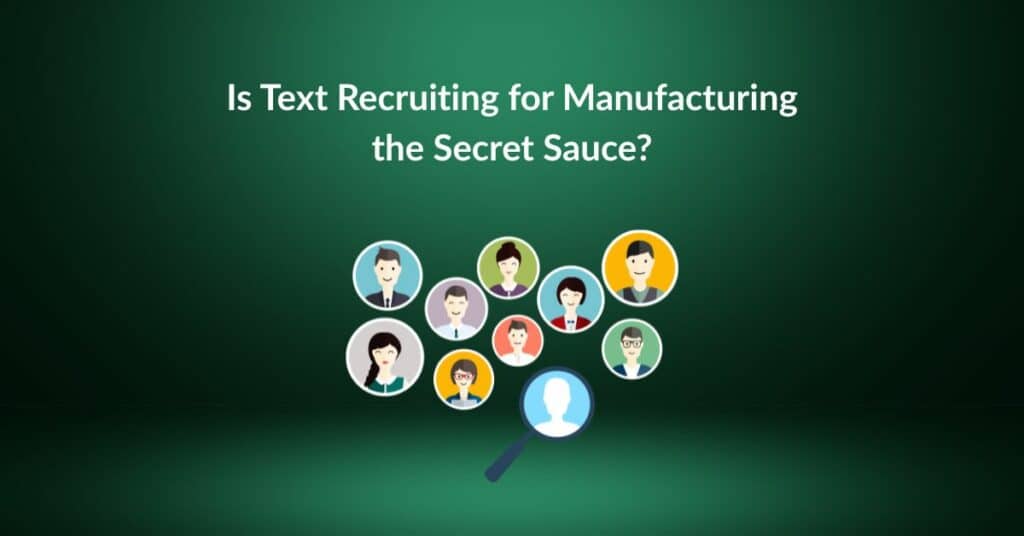
Text Recruiting is the fastest way to engage and schedule candidates within manufacturing, logistics, and warehouse jobs.
Discover how text messaging can enhance your recruitment strategy. This guide will explain how leveraging SMS in manufacturing recruiting with text messaging boosts efficiency, response rates, and reach to non-desk candidates, transforming your approach to hiring.
Key Takeaways
- Text messaging significantly enhances the efficiency of manufacturing recruitment by achieving higher open rates (98%) and faster response times compared to traditional email methods.
- Using SMS for recruitment streamlines various stages, including Text to Hire, candidate outreach, interview scheduling, and automated follow-ups, thereby reducing time-to-hire and preventing communication bottlenecks.
- Best practices in text messaging for recruitment include personalizing messages, keeping them concise and professional, ensuring compliance with privacy regulations, and selecting appropriate text recruiting software to optimize communication and tracking.
1. Benefits of Text Messaging in Manufacturing Recruiting
Text messaging offers a multitude of benefits for manufacturing recruiting, including:
- Impressive open and response rates: Texts have an average open rate of 98 percent, ensuring that your communication is seen promptly by candidates.
- Efficient communication: Candidates typically respond to text messages within 90 seconds, making it an incredibly efficient communication channel.
- Instant communication: This instant communication significantly enhances the recruitment process, allowing recruiters to reach candidates directly on devices they check frequently.
Candidate engagement is another critical advantage. Text messaging can increase read rates to 98% compared to 20% for emails, leading to higher response rates of 60% to 70%. This faster and more efficient communication increases the likelihood of landing a talented long-term hire. In the manufacturing sector, where time is often of the essence, such efficiency can make a significant difference.
A unique aspect of text messaging is its effectiveness in reaching field-worker candidates, who are often not behind a computer screen. Industries like trucking, construction, and healthcare, which have similar challenges, have successfully leveraged SMS for recruitment. Furthermore, 47 percent of job seekers prefer texting as their primary form of communication during the recruitment process, highlighting its popularity.
Overall, text messaging has gained immense popularity in recent years in recruiting, particularly in the manufacturing sector. Text recruiting involves higher response rates and faster time to hire, making it an essential tool for modern recruiters.
2. Streamlining the Recruitment Process with SMS
Text messaging not only offers numerous benefits but also streamlines the recruitment process in several ways. By enabling quick candidate outreach, efficient interview scheduling, and automated follow-ups, SMS makes the recruiting process faster and more effective.
First, SMS recruitment allows recruiters to:
- Reach large pools of candidates in no time, making the process more efficient
- Develop text-based hiring campaigns and send job openings directly to candidates’ phones
- Reach candidates in manufacturing who may not be in front of a computer and can respond faster to text messages
This method is particularly practical for reaching candidates in manufacturing.
Scheduling interviews can be a major bottleneck in the hiring process. Text recruiting software improves efficiency by:
- Reducing the time-to-hire
- Filling positions faster with quick, real-time responses
- Enabling candidates to self-schedule or re-schedule interviews through text
- Sending automated text reminders to prevent ghosting and keep candidates engaged
Automated follow-ups play a crucial role in keeping candidates informed and engaged throughout the hiring process. Automations can save time and increase operational efficiency by creating automated workflows and sending automated texts. This ensures that candidates are never left in the dark and feel valued throughout the recruitment process.
3. Initial Candidate Outreach
Initial candidate outreach through text messaging allows for the efficient promotion of job openings and capturing mobile traffic, especially from mobile phones. Recruiters can promote open positions quickly and efficiently, which is especially important for bulk hiring or seasonal needs. By implementing a well-planned recruiting strategy, SMS recruitment strategy helps better capture mobile traffic by asking candidates to input their mobile number and allowing them to begin their application from their mobile or smartphone device.
Facilitating dialogue with applicants through personalized messages improves colleague relationships and keeps candidates engaged. Using QR codes or text-to-apply automations can help capture jobseeker interest and information, making the messaging more personalized. Recruiters can also use mass texting campaigns to reach out to entire groups of passive candidates at once with personalized messages, ensuring a broad yet tailored approach.
4. Scheduling Interviews with text messaging
Text messaging simplifies interview scheduling, drastically reducing time-to-hire. Here are some benefits of using text messaging for interview scheduling:
- Automated workflows enable candidates to self-schedule or re-schedule interviews through text
- Automated text reminders can prevent ghosting and keep candidates engaged
- This automation alleviates the frustration of playing phone tag with candidates, which delays the interview scheduling process.
Text reminders for interviews can significantly reduce no-shows and last-minute cancellations, thus saving recruiters time. By sending quick text message updates and interview reminders, text messaging helps prevent candidates from dropping out of the hiring process or no-showing for interviews. This ensures a smoother and more efficient interview scheduling process.
5. Automated Follow-Ups and Text Reminder
Automated follow-ups via text messaging can:
- Keep candidates informed and engaged throughout the hiring process
- Play a crucial role in maintaining communication, leading to improved efficiency and candidate experience
- Help in re-engaging past candidates and keeping them informed about new job openings, leveraging your existing talent pool.
Automation within Textline streamlines recruitment processes by sending automated reminders and templated messages, enhancing efficiency. Automated text responses can also answer common candidate questions quickly, helping candidates self-screen and move forward or exit the recruiting process faster. This ensures that candidates are well-informed and the recruitment process is smooth and efficient.
6. Enhancing Candidate Experience in Manufacturing Recruiting
Enhancing the candidate experience is crucial in manufacturing recruiting, and text messaging provides a modern, convenient, and personalized communication channel. Candidates prefer text messages for recruitment communication because they find it fast, simple, and accessible. This method allows for quick and easy communication throughout the recruitment process. Text messaging offers candidates a modern way to apply, get interviews scheduled, and receive hiring status updates without dealing with clunky forms or waiting for emails or calls.
Personalized communication through texting improves candidate experience with quick and transparent responses. Consistent and engaging communication ensures that candidates feel valued and informed throughout the hiring process. This not only enhances their experience but also makes the company more attractive to top talent.
Keeping candidates updated throughout the hiring process via text messages can enhance their experience and boost offer acceptance rates. Textline’s texting software enhances candidate engagement by facilitating two-way communication and ensuring messages are read quickly.
Overall, using text messaging in recruitment significantly improves the candidate experience and increases the likelihood of attracting and retaining top talent.
7. Best Practices for Text Messaging in Manufacturing Recruiting
Implementing best practices for text messaging in manufacturing recruiting is essential for maintaining professionalism and compliance. Automated audience segmentation allows recruiters to send personalized texts to thousands of candidates quickly while managing individual conversations. Messaging templates can ensure every text message is on-brand and error-free by offering pre-uploaded templates for common candidate communications.
Recruiters should avoid including the following in their text messages to maintain professionalism:
- Abbreviations
- Text messaging slang
- Emojis
- Non-alphanumeric symbols
Using complete sentences, proper grammar, and a friendly tone conveys professionalism. Additionally, recruiters should get candidates’ permission before texting and familiarize themselves with local, state, and national regulations to maintain compliance.
8. Personalize Your Messages to Create Context and Get More Responses
From our experience with sending millions of recruiting text messages, there are some quick tips to personalizing messages to get the best results. Additionally, with so many text and WhatsApp based job scams, it’s absolutely critical to create context and make your message personalized, so the candidate knows you are a real human, from a real company.
Tips to personalize your messages:
A. Include the candidates name as the first part of the message. It’s the first thing they will see. If they know it’s for them, you’ll get their attention immediately.
B. Include the senders name. Personalizing messages is key to increasing candidate engagement and improving the overall recruitment process. Scammers won’t have the candidates name and the recruiters name, so that right there will help a lot.
C. Include your title, like “Executive Recruiter”, “Recruiter”, “HR”, “hiring manager”. again.
D. Include your company name. Again… more context is really important because they won’t recognize your phone number, and if they just applied for a job, they might be getting emails and texts from other companies.
E. Keep it short, less than 200 characters.
F. Include a simple call to action… “Reply “Yes” if you’ve like to schedule a call.”
G. Don’t use non-branded link shorteners like “Bit.ly” or “Tiny.url”. These messages will get blocked by the carriers if your sending from a text recruiting software platform.
9. Keep Messages Short and Professional
Keeping messages short and professional is crucial for maintaining a positive and respectful tone while conveying essential information. Messages should be concise due to the 160-character limit of SMS. This limitation encourages recruiters to be clear and direct in their communication.
By adhering to this practice, recruiters can ensure that their messages:
- are easily understood
- do not overwhelm the candidate
- respect the candidate’s time
- maintain a professional image of the company
10. Ensure TCPA Compliance
Ensuring privacy and TCPA Compliance regulations is crucial when using text messaging for recruiting purposes. Obtaining consent through SMS opt-ins is essential for compliance in text recruiting. Documenting candidate communication preferences throughout the hiring process helps stay compliant with privacy regulations.
Peer-to-peer texting ensures compliance by:
- Requiring manual sending of each message
- Providing trackable communication for compliance purposes
- Documenting all communication for reference if needed
Text messages, as opposed to traditional communication channels, are a reliable and efficient way to ensure compliance in communication, making them one of the preferred communication methods.
11. Selecting the Right Text Recruiting Software
Selecting the right text recruiting software involves considering features such as seamless scheduling, personalized templates, and analytics capabilities to streamline the recruitment process. Text recruiting platforms typically offer features such as seamless scheduling of messages, personalized templates for texting, and the ability to track and analyze responses. Textline’s texting software includes a bulk SMS feature that allows recruiters to send mass messages to large candidate pools, making it easier to communicate new roles or important updates.
When selecting text recruiting software, it’s important to consider the ROI, ensuring that the investment brings immediate value by streamlining the recruitment process. When you integrate iCIMS text engagement software with your current recruitment platform, it offers the following benefits:
- Consolidates all hiring-related communication activities into a single system of record
- Streamlines the process for both recruiters and candidates
- Makes it more efficient for everyone involved
12. Integrating Text Messaging with Your Recruitment Platform
Integrating text messaging with your recruitment platform offers several benefits:
- Consolidates hiring-related communication activities
- Simplifies the process
- Ensures compliance
- Recruiters can reach candidates instantly, eliminating the need for lengthy phone calls or email exchanges
- Streamlines the communication process and saves time for both parties
- A centralized messaging system can integrate with existing tech like CRM or ATS, ensuring compliance and better tracking of communications.
TextUs enables manufacturing companies to:
- Track messages in their HRIS/CRM systems automatically, simplifying communication management
- Integrate text messaging with an Applicant Tracking System (ATS) to ensure the recruiting process for every role is always updated and allow recruiters to surface past candidates for new roles
- Manage candidate conversations and prevent the silos of communication that occur when recruiters use personal devices
This centralized platform helps streamline communication and improve efficiency in the recruiting process.
Shared inboxes in a text messaging platform foster collaboration among recruiters and provide visibility into conversations happening with candidates. Additionally, AI chatbots in text messaging platforms can instantly respond to candidate messages and provide crucial information when recruiters are unavailable. This ensures that communication is seamless and efficient, enhancing the overall recruitment strategy.
13. Measuring the Success of Your Text Messaging Campaigns
Measuring the success of text messaging campaigns in recruiting involves tracking metrics such as response rates, response times, and candidate drop-off rates to optimize and refine strategies. Tracking metrics like delivery and response rates helps optimize text recruiting campaigns. Metrics like text message response rates and response times are key indicators of recruiting text effectiveness.
Monitoring candidate drop-off rates provides insights into where candidates lose interest in the recruitment process. Analyzing hires made through text messaging quantifies the direct impact of text recruiting efforts. A text messaging platform can include analytics features to refine recruiting strategies and share performance metrics with stakeholders. Conducting A/B tests with different text message content helps optimize message performance.
Recruiters have the ability to access convenient real-time analytics dashboards. These dashboards help them measure engagement and conversions effectively. By understanding and acting on these metrics, recruiters can continuously improve their text messaging campaigns, ensuring they remain effective and efficient.
Summary
Text messaging has revolutionized the manufacturing recruiting process by providing a fast, efficient, and effective communication channel. The numerous benefits, including higher response rates, faster communication, and enhanced candidate engagement, make it an essential tool for modern recruiters. By streamlining the recruitment process, enhancing the candidate experience, and ensuring compliance, text messaging has proven to be a game-changer in the industry.
As we have seen through case studies and best practices, implementing text messaging in your recruitment strategy can lead to significant improvements in efficiency and candidate satisfaction. By selecting the right text recruiting software and integrating it with your existing recruitment platform, you can ensure a seamless and effective hiring process. Embrace text messaging in your recruitment efforts and witness the transformation in your ability to attract and hire top talent swiftly.
Frequently Asked Questions
Why should I use text messaging in manufacturing recruiting?
You should use text messaging in manufacturing recruiting because it provides higher response rates, faster communication, and increased candidate engagement, making it an efficient tool for recruiting.
How can text messaging streamline the recruitment process?
Using text messaging for candidate outreach, interview scheduling, and follow-ups can significantly reduce time-to-hire and improve overall recruitment efficiency.
What are the best practices for using text messaging in recruiting?
When using text messaging in recruiting, it’s important to personalize messages, keep them short and professional, and ensure compliance with privacy regulations. This ensures effective communication with potential candidates.
How do I select the right text recruiting software?
To select the right text recruiting software, focus on features like seamless scheduling, personalized templates, and analytics. Also, consider the ROI and how well it integrates with your current recruitment platform.
Can you provide examples of successful text messaging in manufacturing recruiting?
Yes, successful examples of text messaging in manufacturing recruiting include case studies of companies like Hamilton-Ryker and RPM Pizza, which saw improvements in applicant flow, order fulfillment, and reduced time-to-hire.


 16 February, 2026
16 February, 2026

